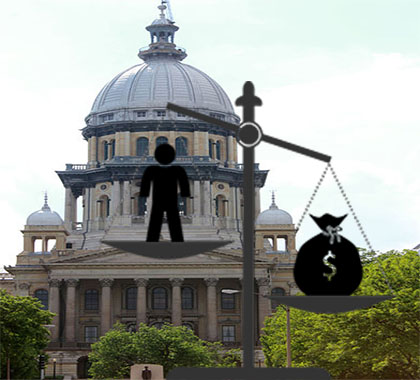Illinois tax burdens got heavier in July when the state legislature overrode Gov. Bruce Rauner’s veto of Senate Bill 6 to enact the state’s first full appropriations legislation in more than two years.
The Illinois House and Senate voted to override Rauner’s veto on July 6. On July 11, the state’s personal income tax rate officially increased from 3.75 percent to 4.95 percent. The business tax rate increased from 5.25 percent to 7 percent.
The veto override broke a two-year deadlock between Rauner and the legislature. Lawmakers demanded more taxes and higher spending, while Rauner pressed for reductions in taxes and spending.
‘Will Only Hurt Illinois’
Ted Dabrowski, vice president of policy for the Illinois Policy Institute, says the new budget will accelerate the state’s economic decline.
“This budget will only hurt Illinois more, because it only taxes what are some of the highest-taxed residents of the country without providing any of the economic spending reforms that were so needed to bring back an economic vibrancy the state needs,” Dabrowksi said. “I think it will just chase more people and more businesses away, because there are no true spending and economic reforms.
“A balanced budget for one year simply tries to ensure the revenues and expenses are equal,” Dabrowksi said. “What’s really important about a budget is the inherent policies that are behind it, versus the current economic policies that are bringing the state down.”
‘Most Anti-Taxpayer’ Policy
Jonathan Williams, chief economist and vice president for the Center for State Fiscal Reform at the American Legislative Exchange Council, says the veto override is a big letdown for taxpayers.
“This is one of the most anti-taxpayer things we’ve seen happen in the states in 2017,” Williams said. “The 32 percent income tax increase is going to be very anti-taxpayer, generally.”
Lessons from the Past
Williams says raising taxes will not solve the state’s budget problems.
“If history is our guide, it wasn’t all that long ago that we had a big tax increase in Illinois that was supposed to solve unpaid bills and the budget crisis,” Williams said. “Of course, that proved to not happen, and unpaid bills basically stayed roughly the same even with the massive tax increase.
“A reasonable person should ask the question, ‘Why should this be any different from the first time?'” Williams said. “If there’s no control on the growth of government, spending, pensions, unfunded obligations, and no substantive reforms in this package, I don’t think we should expect an outcome any different from the last time taxes were raised significantly across Illinois.”





